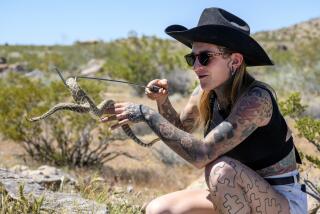Snake experts hunt down an Everglades invader
- Share via
FORT LAUDERDALE, FLA. — Go ahead, stretch out in the soft grass. It’s comfortable. You’re surrounded by a smorgasbord of prey. You may belong half a world away, but here in the Everglades, life is good.
Except you’re a Burmese python, and the state wants to hunt you down and kill you. It hasn’t put a bounty on your head, but it may as well have: If caught, you’re decapitated.
In this moonlit world of marsh, bug and fanged danger, snake hunter Jeff Fobb is top predator.
He’s one of seven snake experts licensed by the Florida Fish and Wildlife Conservation Commission to stalk the slithering python, whose intrusion into the Everglades upsets the ecosystem’s delicate balance.
Of the six snakes captured since the three-month trial eradication program began July 17, Fobb and his team have accounted for four: three hatchlings found at once and a 6-footer snared Thursday night.
“The best thing that’s going to come out of this is the collection of scientific information for the state,” says Fobb, who as part of his license must weigh, measure and determine the sex of the snake, log in its GPS coordinates, kill it humanely and examine its stomach contents.
But first he has to find them.
Throughout the night Thursday, the snake hunters traversed Everglades access roads, shining headlamps into the roadside where pythons lurk to ambush prey.
Marinating in a mix of sweat and bug spray, Fobb and another reptile enthusiast, Michael Tisdale, trekked a 10-mile route under a hazy sky.
“I’m not looking at making money,” says Fobb, 43, a longtime snake expert with the elite venom response unit of the Miami-Dade Fire Rescue. “This is an excuse to go fool around in the Everglades.”
The exotic snakes, which escaped or were released by owners, have been in the Everglades for years, competing for food with native species. They can grow 6 feet in a year, up to 20 feet and 200 pounds.
The trial program, in which certified snake experts are licensed to hunt pythons on state land from Lake Okeechobee south, is designed to thin the snakes’ ranks and gather data.
Officials with Everglades National Park, where several private agents hunt pythons on federal land, say the snakes could number 5,000 to 140,000. “They have huge clutches, 40 to 100 eggs,” park spokeswoman Linda Friar says.
On Thursday’s hunt, Fobb, and Tisdale, 46, encounter minor marsh denizens: owls, yellow striped lubber grasshoppers and bufos, the largest of Florida’s frogs and toads.
Unseen but ever present are deadlier swamp inhabitants: water moccasins, diamondback rattlesnakes, coral snakes and pygmy rattlers.
The ubiquitous poisonwood plant is another hazard. Brush against its sap and your flesh may swell and discolor. The mosquitoes come in waves.
Another licensed hunter, Robert Sonner, 41, joined the trek with three volunteers from the wildlife center he operates. One of those helpers, Willie Cabrera, 25, is accompanied by Chino, a Shar-Pei mix. “Our Burm bait dog,” Cabrera jokes.
Cabrera snags the night’s sole python. “I just saw it there and grabbed it,” he says.
The hunters carry snake hooks, like long-handled question marks, but they usually snatch a python by hand, tail first, then behind the head. “So it doesn’t wrap around you,” Cabrera says.
The snake still tries to strike, stretching wide its mouth with six rows of recurved teeth. “This size, they’ll make you bleed a little,” Cabrera says.
But the hunters maintain control. “We have hands -- that’s the advantage,” Fobb says. “Hands and brains.”
At hunt’s end the snake, a 70-inch female, is stretched across a pickup’s tailgate. Another helper, Lauren Rosenthal, 27, places a knife at the base of its skull. The cut must be quick and sure, like a chef chopping a carrot.
Once the head is severed, Fobb uses a small rod to pith it, or scramble its brains, ensuring a quick death. Veterinarians recommend this as humane.
“It breaks my heart to kill them, but we’re protecting our native wildlife,” Sonner says.
Adds Fobb, “That’s the least pleasant part of this experience.”
--
More to Read
Sign up for The Wild
We’ll help you find the best places to hike, bike and run, as well as the perfect silent spots for meditation and yoga.
You may occasionally receive promotional content from the Los Angeles Times.






